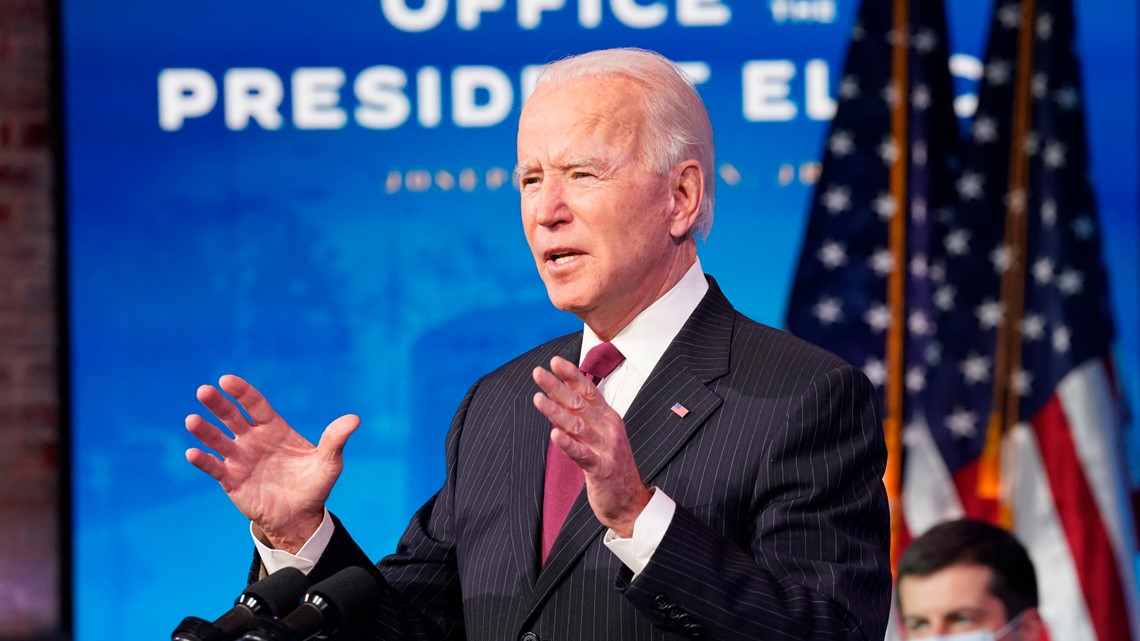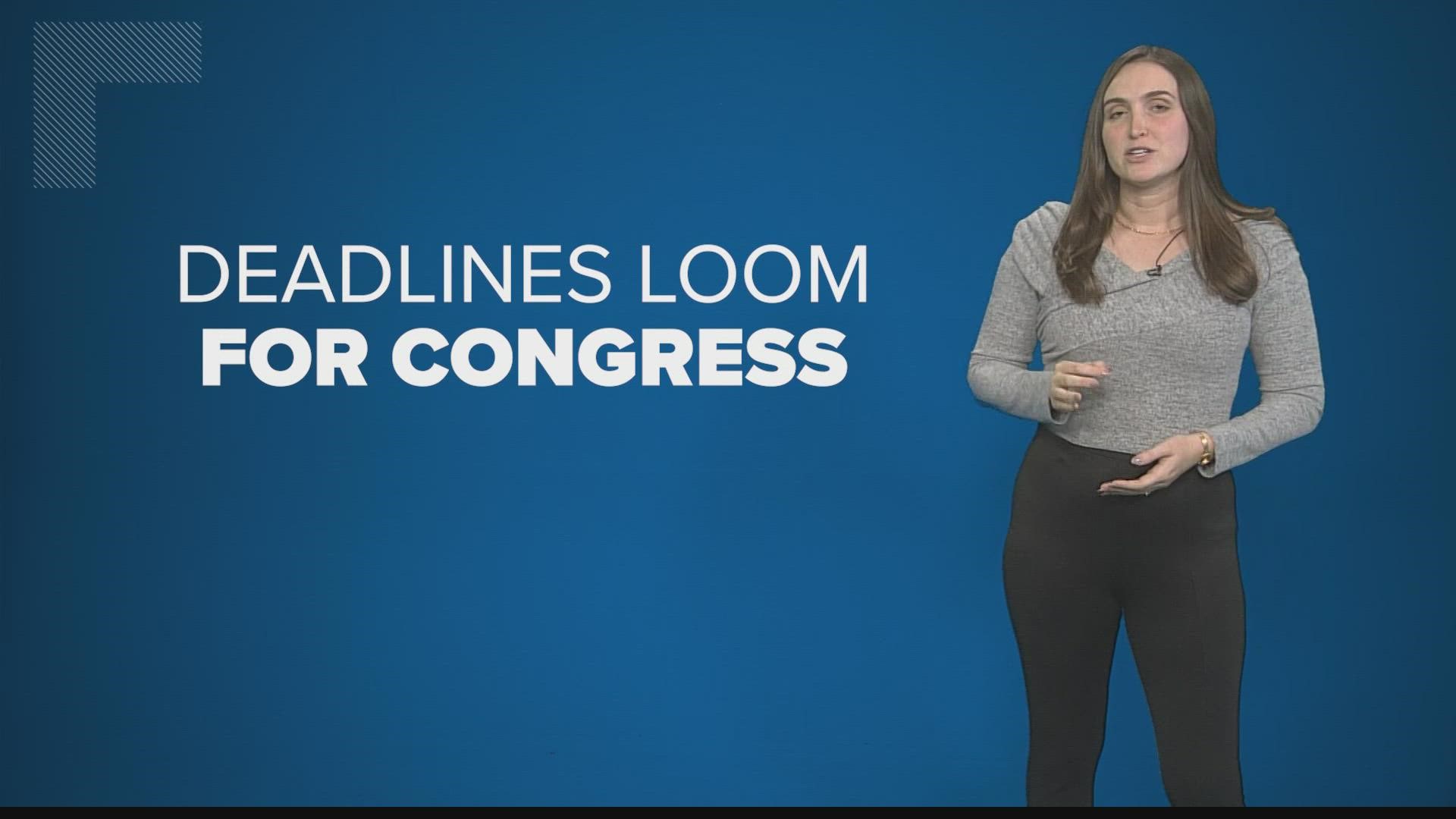WASHINGTON — If you're starting to feel some of that post-Thanksgiving dread starting to sink in — mentally reviewing lights that need to be hung or working to schedule holidays dinners with cross-country family members — take a quick look at everything Congress has on their plate this holiday season.
After returning from Thanksgiving recess, Congress faces a long list of crucial deadlines. Through December, lawmakers are tasked with funding the federal government, the military, avoiding a first-ever debt default, and passing what's been called the most transformative piece of social legislation in decades.
"As you know, the legislative agenda for the remainder of 2021 is considerable," Senate Majority Leader Chuck Schumer said in a letter to colleagues sent before Thanksgiving recess. "I am confident we can get each of these important items done this year, but it will likely take some long nights and weekends."
Ahead of this four-week holiday frenzy, here's an outline of what Congress has to do before the end of the year, and the proposed deadline for each item.
- Task 1 - Fund the government and avoid a government shutdown– Dec. 3
On Friday, Dec. 3, federal agencies will run out of money.
That's the date when a current stopgap measure that was passed back in September, which itself was a continuation of the Trump administration's previous stopgap bill that was passed in 2020, will end.
That stopgap bill avoided a government shutdown temporarily but punted the problem off to December. Democrats have said they want to pass a new budget but, unlike a few other measures on the agenda in December, they will need Republican support to do it.
As the Dec. 3 deadline looms, it's unlikely Congress will pass all of its necessary appropriations bills needed to fund the federal government, opting instead for another continued resolution that could continue into early 2022.
If Congress cannot agree on a continued resolution, the U.S. could see a government shutdown.
The effect would be immediate. National parks could close, and it will be harder for the government to distribute SNAP food benefits to some 42 million people. Mortgages could also be harder to obtain.


Essential services like law enforcement, border protection, and air traffic control will continue, but many employees in those sectors will be working without pay like they did at the tail and of 2018 and beginning of 2019.
- Task 2 - Raise the debt ceiling to avoid a default – Dec. 15
U.S. Treasury Secretary Janet Yelllen said Congress has until Dec. 15 to raise the debt ceiling and avoid a default.
Congress agreed to temporarily raise the debt limit for two months to avoid defaulting on debt.
The debt limit, sometimes called the debt ceiling, is the amount of debt the U.S. government is legally allowed to have.
When the debt ceiling is reached, the federal government isn't allowed to honor spending that's already happened.
That means the U.S. government would default on those past payments, which would have an immediate ripple effect on Americans.
Social security benefits for some 50 million people could end. U.S. troops could not get paid. It could increase interest rates as well, so people with any federal loans could be at risk of an immediate default.
The federal government doesn't want that to happen, so lawmakers can vote to increase or suspend the debt ceiling in order to avoid that default.
Raising or suspending the debt ceiling allows them to continue paying for purchases they made previously, but does not permit new spending.
The U.S. has approached the debt limit 17 times since 2001 and, at every point, Congress voted to raise or suspend the debt ceiling to avoid a default.
- Task 3 - Pass the Reconciliation Bill – Dec. 25
If President Joe Biden were writing this to-do list, he likely would put this item at No. 1.
On Nov. 19, the House passed the Senate's $1.7 trillion infrastructure bill along party lines in a 220-213 vote. One Democrat voted "not." The legislation includes $555 billion for climate initiatives, $109 billion for universal pre-K, $150 billion for affordable housing and $167 billion for Medicare expansion.


Biden’s sweeping social agenda includes $109 billion for universal pre-k, $555 billion for climate initiatives, $150 billion for affordable housing among a slew of other measures.
The bill now heads to the Senate, where Senate Democrats are using a process called reconciliation to pass the legislation without Republican support.
That means the bill needs a simple majority to pass in the Senate, support from all 50 Democrats that has been hard to come by as centrist Democrats face off against progressive over the bill's price tag versus which portions get cut.
Senate Democrats gave themselves until Christmas Day to come up with a solution.
- Funding the military – Likely second week of December
Because the House pushed back consideration of the Build Back Better Act to the week of Nov. 15, the date for the Senate to consider the National Defense Authorization Act was also stalled.
In September, the House voted 316-113 to pass a $778 billion Pentagon policy bill, also called the National Defense Authorization Act.
"I made a commitment to having a vote on this proposal in 2021 and the NDAA is a logical place to have that vote," Rep. Schumer wrote in a Dear Colleague letter.
The bill, also called S. 2792, would authorize appropriations totaling an estimated $768.0 billion over the 2022‑2026 period.
The bill also contains provisions that would affect the costs of defense programs, that would be funded with discretionary appropriations in 2023 and future years.
Those provisions would mainly affect force structure, compensation and benefits, and multiyear procurement of weapons systems.

